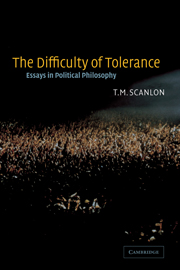Book contents
- Frontmatter
- Contents
- Acknowledgments
- Introduction
- 1 A theory of freedom of expression
- 2 Rights, goals, and fairness
- 3 Due process
- 4 Preference and urgency
- 5 Freedom of expression and categories of expression
- 6 Human rights as a neutral concern
- 7 Contractualism and utilitarianism
- 8 Content regulation reconsidered
- 9 Value, desire, and quality of life
- 10 The difficulty of tolerance
- 11 The diversity of objections to inequality
- 12 Punishment and the rule of law
- 13 Promises and contracts
- Index
3 - Due process
Published online by Cambridge University Press: 15 December 2009
- Frontmatter
- Contents
- Acknowledgments
- Introduction
- 1 A theory of freedom of expression
- 2 Rights, goals, and fairness
- 3 Due process
- 4 Preference and urgency
- 5 Freedom of expression and categories of expression
- 6 Human rights as a neutral concern
- 7 Contractualism and utilitarianism
- 8 Content regulation reconsidered
- 9 Value, desire, and quality of life
- 10 The difficulty of tolerance
- 11 The diversity of objections to inequality
- 12 Punishment and the rule of law
- 13 Promises and contracts
- Index
Summary
In this essay I will offer a general account of how the absence of due process can give rise to legitimate claims against institutional actions. I will be concerned particularly to show in what ways claims to due process are grounded in moral principles of political right and how far they depend rather on strategic judgments about the prudent design of social institutions. My account will provide a demarcation of the area within which due process claims are appropriate – an area much broader than “state action” – and provide at least a rough framework for determining when given procedures are adequate responses to these claims. I will also offer an account of substantive due process and undertake to explain why it is that when a legal right to due process is recognized, courts, in enforcing this right, will find themselves making substantive as well as merely procedural decisions.
The account I will offer sticks close to the truism that due process is concerned with protection against arbitrary decisions, and one can find a place in my account for many of the phrases that have been used in interpreting the Fifth and Fourteenth Amendments to the United States Constitution. But while I will have a certain amount to say in the abstract about the role of courts in providing and enforcing due process, my account is a philosophical and not a legal one.
- Type
- Chapter
- Information
- The Difficulty of ToleranceEssays in Political Philosophy, pp. 42 - 69Publisher: Cambridge University PressPrint publication year: 2003

